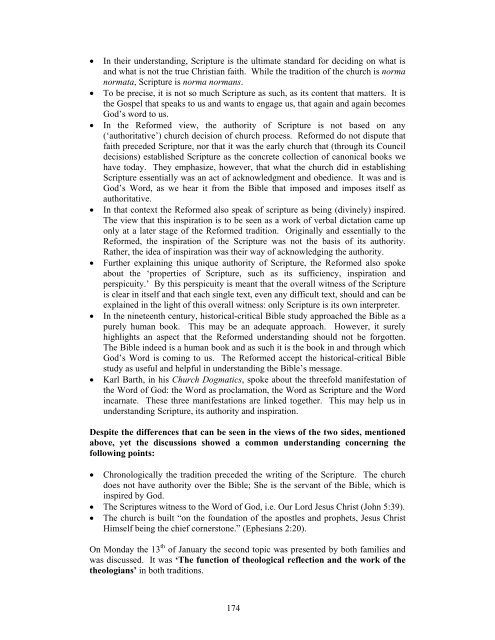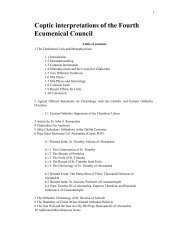Coptic Church & Ecumenical Movement - Saint Mina Coptic ...
Coptic Church & Ecumenical Movement - Saint Mina Coptic ...
Coptic Church & Ecumenical Movement - Saint Mina Coptic ...
You also want an ePaper? Increase the reach of your titles
YUMPU automatically turns print PDFs into web optimized ePapers that Google loves.
• In their understanding, Scripture is the ultimate standard for deciding on what is<br />
and what is not the true Christian faith. While the tradition of the church is norma<br />
normata, Scripture is norma normans.<br />
• To be precise, it is not so much Scripture as such, as its content that matters. It is<br />
the Gospel that speaks to us and wants to engage us, that again and again becomes<br />
God’s word to us.<br />
• In the Reformed view, the authority of Scripture is not based on any<br />
(‘authoritative’) church decision of church process. Reformed do not dispute that<br />
faith preceded Scripture, nor that it was the early church that (through its Council<br />
decisions) established Scripture as the concrete collection of canonical books we<br />
have today. They emphasize, however, that what the church did in establishing<br />
Scripture essentially was an act of acknowledgment and obedience. It was and is<br />
God’s Word, as we hear it from the Bible that imposed and imposes itself as<br />
authoritative.<br />
• In that context the Reformed also speak of scripture as being (divinely) inspired.<br />
The view that this inspiration is to be seen as a work of verbal dictation came up<br />
only at a later stage of the Reformed tradition. Originally and essentially to the<br />
Reformed, the inspiration of the Scripture was not the basis of its authority.<br />
Rather, the idea of inspiration was their way of acknowledging the authority.<br />
• Further explaining this unique authority of Scripture, the Reformed also spoke<br />
about the ‘properties of Scripture, such as its sufficiency, inspiration and<br />
perspicuity.’ By this perspicuity is meant that the overall witness of the Scripture<br />
is clear in itself and that each single text, even any difficult text, should and can be<br />
explained in the light of this overall witness: only Scripture is its own interpreter.<br />
• In the nineteenth century, historical-critical Bible study approached the Bible as a<br />
purely human book. This may be an adequate approach. However, it surely<br />
highlights an aspect that the Reformed understanding should not be forgotten.<br />
The Bible indeed is a human book and as such it is the book in and through which<br />
God’s Word is coming to us. The Reformed accept the historical-critical Bible<br />
study as useful and helpful in understanding the Bible’s message.<br />
• Karl Barth, in his <strong>Church</strong> Dogmatics, spoke about the threefold manifestation of<br />
the Word of God: the Word as proclamation, the Word as Scripture and the Word<br />
incarnate. These three manifestations are linked together. This may help us in<br />
understanding Scripture, its authority and inspiration.<br />
Despite the differences that can be seen in the views of the two sides, mentioned<br />
above, yet the discussions showed a common understanding concerning the<br />
following points:<br />
• Chronologically the tradition preceded the writing of the Scripture. The church<br />
does not have authority over the Bible; She is the servant of the Bible, which is<br />
inspired by God.<br />
• The Scriptures witness to the Word of God, i.e. Our Lord Jesus Christ (John 5:39).<br />
• The church is built “on the foundation of the apostles and prophets, Jesus Christ<br />
Himself being the chief cornerstone.” (Ephesians 2:20).<br />
On Monday the 13 th of January the second topic was presented by both families and<br />
was discussed. It was ‘The function of theological reflection and the work of the<br />
theologians’ in both traditions.<br />
174








